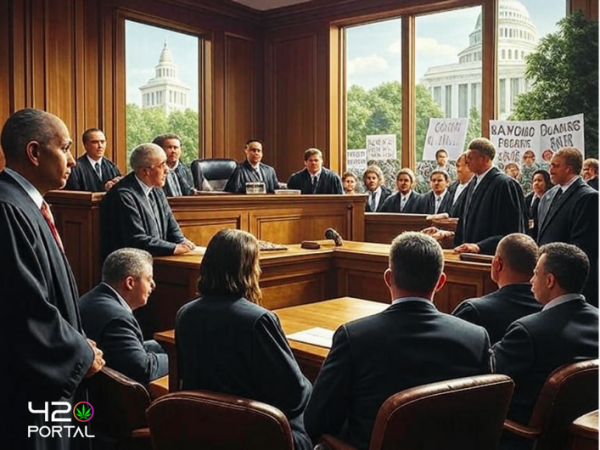Florida Law Threatens Medical Marijuana Access for Users Facing Drug Charges

07/18/2025
In Florida, a recent law has introduced significant risks for medical marijuana patients, potentially leading to the suspension or revocation of their access cards if they face certain drug-related charges. This measure allows the state Department of Health to suspend a patient's registration upon being charged with violations under the state's drug abuse prevention and control statutes. If convicted or if they enter specific pleas, the registration can be permanently revoked, affecting both patients and their caregivers. The law aims to curb potential abuse of the medical marijuana system, treating the card as a privilege that can be withdrawn for non-compliance with broader drug laws.
Nearly one million Floridians hold prescriptions for medical marijuana, using it to manage conditions like chronic pain, anxiety, and epilepsy. However, under this provision, even those who are legally prescribed cannabis could lose their ability to purchase it from licensed treatment centers if accused of offenses such as possessing marijuana outside the regulated system or other controlled substance violations. Critics argue that this creates an unfair double standard, penalizing patients for actions that may stem from their medical needs, while similar privileges, such as driver's licenses, are often restored after suspensions for comparable infractions.
Advocates for medical marijuana, including prominent figures who championed its legalization, have voiced strong opposition, claiming the law undermines voter-approved constitutional protections for the program. They link the restrictions to influences from the pharmaceutical industry, which allegedly opposes cannabis as a competitor to prescription opioids and other drugs. One critic remarked that opponents of medical marijuana include those profiting from substances linked to the opioid crisis, highlighting the irony of restricting a safer alternative. Medical professionals in the field have also questioned the policy, comparing it to DUI cases where driving rights are typically reinstated post-suspension, asking why medical access should be treated more harshly.
Supporters of the law, including state Republican leaders, defend it as a necessary safeguard to prevent exploitation of the medical system for recreational purposes or other illicit activities. They emphasize that the program is intended solely for therapeutic use in approved illnesses, and revoking access for drug crimes ensures integrity. The statute outlines additional grounds for revocation, such as acquiring marijuana from unauthorized sources or providing false information during registration.
The implications extend beyond individual patients, potentially discouraging people from seeking medical marijuana treatment due to fear of amplified penalties. If efforts to legalize recreational marijuana succeed through voter initiatives, it could prompt amendments to ease these restrictions, though the outcome remains uncertain. As Florida grapples with evolving cannabis policies, this law highlights the tension between public health, law enforcement, and personal freedoms in the state's medical marijuana framework.
Reference
Nearly one million Floridians hold prescriptions for medical marijuana, using it to manage conditions like chronic pain, anxiety, and epilepsy. However, under this provision, even those who are legally prescribed cannabis could lose their ability to purchase it from licensed treatment centers if accused of offenses such as possessing marijuana outside the regulated system or other controlled substance violations. Critics argue that this creates an unfair double standard, penalizing patients for actions that may stem from their medical needs, while similar privileges, such as driver's licenses, are often restored after suspensions for comparable infractions.
Advocates for medical marijuana, including prominent figures who championed its legalization, have voiced strong opposition, claiming the law undermines voter-approved constitutional protections for the program. They link the restrictions to influences from the pharmaceutical industry, which allegedly opposes cannabis as a competitor to prescription opioids and other drugs. One critic remarked that opponents of medical marijuana include those profiting from substances linked to the opioid crisis, highlighting the irony of restricting a safer alternative. Medical professionals in the field have also questioned the policy, comparing it to DUI cases where driving rights are typically reinstated post-suspension, asking why medical access should be treated more harshly.
Supporters of the law, including state Republican leaders, defend it as a necessary safeguard to prevent exploitation of the medical system for recreational purposes or other illicit activities. They emphasize that the program is intended solely for therapeutic use in approved illnesses, and revoking access for drug crimes ensures integrity. The statute outlines additional grounds for revocation, such as acquiring marijuana from unauthorized sources or providing false information during registration.
The implications extend beyond individual patients, potentially discouraging people from seeking medical marijuana treatment due to fear of amplified penalties. If efforts to legalize recreational marijuana succeed through voter initiatives, it could prompt amendments to ease these restrictions, though the outcome remains uncertain. As Florida grapples with evolving cannabis policies, this law highlights the tension between public health, law enforcement, and personal freedoms in the state's medical marijuana framework.
Reference







